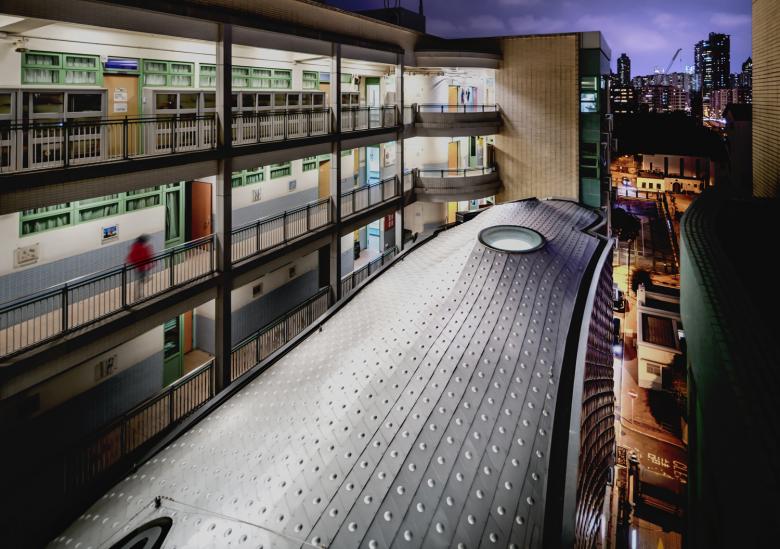Aesthetics of Density
Hong Kong is considered a city of extreme density due to the large number of high-rise buildings. This brings advantages; for public transport provision, for example. A limited buildable area causes high site values, that in turn necessitate this high building density. Some negatives of this density are that each resident has on average only nine square meters of living space, and that the standard commercial character of the construction often prevents architecture from taking a stand. All design proposals for all functions are subject to extreme densification, including schools that tower up many floors.
Client: Alliance Primary School Kowloon Tong, Hong Kong
Completion: January 2020
Cost: approx. 5,590,000 USD
Address: 2 Lancashire Road, Kowloon Tong, Hong Kong
Area: 300 + 150 + 200 sqm
Contractor: Ming Kee Construction (Steelwork) Engineering Ltd.
Structural engineer: James Lau and Associates Ltd.
Mechanical and electrical Engineer: Pinebridge Consulting Ltd.
Quantity surveyor: KCIManagement Consultancy Ltd.
Acoustic and audio-visual solutions: ON Technology Ltd.
BIM: Kevin Lim
Model: Raymond Chan
Project manager: PLAAP Design Ltd., Michelle Kwok
Photos: Fiona Bao
Groundwork Architects was commissioned to plan the music room extension to the Alliance Primary School in Kowloon established in 1992. The school is of the opinion that music makes a significant contribution to children’s development and already had a great student orchestra but was missing a rehearsal room. The question of how architecture can help to promote aesthetic education became the starting point for the design.
The difficulty was finding a place for a music hall on the fully built-up property. The only free space was the approximately 200 square meter school yard on the roof. But classrooms on six further floors of the school building were efficiently reached from corridors accessed from this inner courtyard. The architects did not want to sacrifice this space and therefore decided to move the new hall upwards, covering over the schoolyard. In this way, a semi-open auditorium and a break time play-yard were created.
The architects opted for an organically shaped volume inserted into the courtyard, at a distance from the facades of the standard functional building. The irregular steel structure with gently curved surfaces visually stands out from its surroundings, not least because of the facade design with its dark nubs reminiscent of a reptile, referencing Pop Art of the 1960s. The shiny silver roof with circular skylights can be seen from the upper level classroom corridors and was therefore an important part of the design.
So too is the underside of the music hall, seen from the school yard underneath. This undulating surface is clad with wooden panels that extend to the ground along a structural support. Although the space is open to the elements and rain can fall through the narrow gaps between the buildings, these wooden panels create the feeling of an interior, one that contrasts sharply with the rigid, hard material of the existing building. A curved open staircase leads up into the music hall from the schoolyard and a second entrance is reached via a short bridge from an upper level corridor on the opposite side of the yard.
The interior of the music hall is uniformly lined with acoustic panels, covered on all side walls with a semi-transparent chiffon fabric. The few skylights combined with integrated artificial lighting give the room a festive atmosphere that makes it easy for children to practice their musical instruments diligently.
From an architectural point of view, what in this case is a relatively small music hall has nonetheless achieved an aesthetic upgrade of the entire school building ensemble; however, one that is hardly noticeable from the outside due to the extreme density of the building and surroundings. For the children, however, a «wall flower» was created – as the architects called it – that is certainly not just an acoustic educational envelope, but also a significant and tangible contribution to their aesthetic education.















